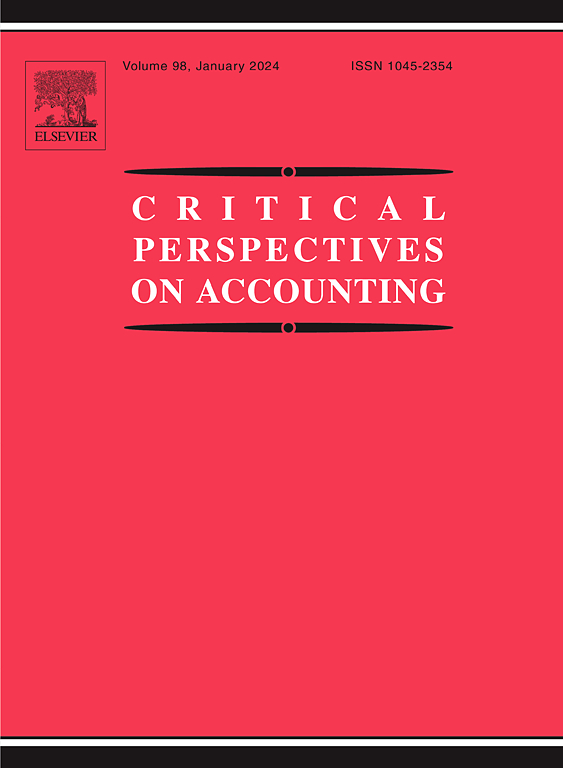拒绝玩游戏?初级审计师与四大会计师事务所审计质量的立场视角
IF 5.7
2区 管理学
Q1 BUSINESS, FINANCE
引用次数: 0
摘要
在一系列备受瞩目的丑闻之后,审计质量问题继续在从业者、政策制定者和学术界引起广泛的争论。与此同时,越来越多的“多元”多方法文献已经发展起来,试图通过会计师事务所的文化和工作实践来更好地理解审计失败。在本文中,我们借鉴“批判性绩效”理论来进一步理解导致审计失败的后台社会技术安排。在详细阐述这种方法的方法时,我们从初级审计师的角度进行了多方法的“立场”分析,并遵循了一家四大会计师事务所的重大审计质量倡议。我们的分析表明,该计划不仅未能解决核心审计质量问题,而且还在“不惜一切代价完成”的文化中推动不那么关键的“打勾”方法,从而加剧了这些问题。我们发现,相当多的受训者在反对这种“打勾”的方法,并试图更加强调挑战客户的过程中,对审计产生了批判性的看法。我们将这些受训者定义为“拒绝参与游戏”,但注意到这些批判性观点在公司内部越来越被边缘化,这些受训者中的大多数计划在培训合同结束时离开公司。我们认为,这些结论是从公司内部的批判性观点得出的,为我们提供了一个重要的基础,可以在此基础上就如何更好地支持初级审计师以及如何进一步发展他们的批判性观点提出切实可行的建议。本文章由计算机程序翻译,如有差异,请以英文原文为准。
Refusing to play the game? Junior auditors and a standpoint perspective on audit quality in a Big-4 accounting firm
Following numerous high-profile scandals, the issue of audit quality continues to attract extensive debate among practitioners, policy makers and academics. Meanwhile, an increasingly ‘pluralistic’ multi-method literature has developed, seeking to better understand audit failure through the range of cultures and working practices in accounting firms. In this paper, we draw on the theory of ‘critical performativity’ to further our understanding of the backstage socio-technical arrangements contributing to audit failure. In elaborating on the methodology for such an approach, we conduct a multi-method ‘standpoint’ analysis from the perspective of junior auditors, following a major audit quality initiative in a Big-4 firm. Our analysis shows that the initiative not only failed to address core audit quality issues, it also exacerbated them by driving a less critical “box-ticking” approach in a “get it done at all costs” culture. We found that a significant number of trainees developed critical perspectives on auditing as they pushed back against this “box-ticking” approach and sought to place more emphasis on challenging the client. We frame these trainees as “refusing to play the game”, but note that these critical perspectives were increasingly marginalised within the firm, with the large majority of these trainees planning to leave the firm at the end of their training contracts. We suggest that these conclusions, which are drawn from critical perspectives within the firm, provide us with an important basis from which to make practical suggestions on how junior auditors can be better supported, and how their critical perspectives can be further developed.
求助全文
通过发布文献求助,成功后即可免费获取论文全文。
去求助
来源期刊

Critical Perspectives on Accounting
BUSINESS, FINANCE-
CiteScore
9.40
自引率
7.80%
发文量
91
期刊介绍:
Critical Perspectives on Accounting aims to provide a forum for the growing number of accounting researchers and practitioners who realize that conventional theory and practice is ill-suited to the challenges of the modern environment, and that accounting practices and corporate behavior are inextricably connected with many allocative, distributive, social, and ecological problems of our era. From such concerns, a new literature is emerging that seeks to reformulate corporate, social, and political activity, and the theoretical and practical means by which we apprehend and affect that activity. Research Areas Include: • Studies involving the political economy of accounting, critical accounting, radical accounting, and accounting''s implication in the exercise of power • Financial accounting''s role in the processes of international capital formation, including its impact on stock market stability and international banking activities • Management accounting''s role in organizing the labor process • The relationship between accounting and the state in various social formations • Studies of accounting''s historical role, as a means of "remembering" the subject''s social and conflictual character • The role of accounting in establishing "real" democracy at work and other domains of life • Accounting''s adjudicative function in international exchanges, such as that of the Third World debt • Antagonisms between the social and private character of accounting, such as conflicts of interest in the audit process • The identification of new constituencies for radical and critical accounting information • Accounting''s involvement in gender and class conflicts in the workplace • The interplay between accounting, social conflict, industrialization, bureaucracy, and technocracy • Reappraisals of the role of accounting as a science and technology • Critical reviews of "useful" scientific knowledge about organizations
 求助内容:
求助内容: 应助结果提醒方式:
应助结果提醒方式:


